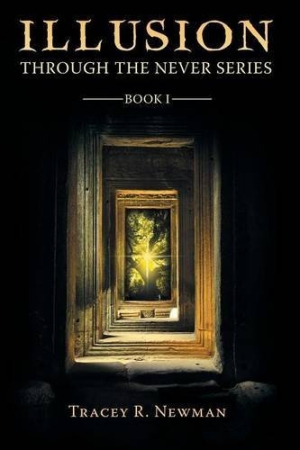Illusion
This complex fantasy has its own unique mythos and style.
Tracey R. Newman’s Illusion is a wild ride through various mythologies and ancient histories, centered on cosmic drama and reincarnation.
Nickolaus Piper, a famed University of London archaeologist, finds himself embroiled in more than he bargained for when an expedition to Bolivia turns ugly, and his mentor, Tobias Alger, is murdered. Spiraling into a state of despondent drinking and passionless relationships, Nick seems on the verge of total implosion.
Suddenly, mysterious forces begin appearing in Nick’s life. English noble Lily Drescher is also swept up in the bizarre events; together with police detective Mason Chase, they must embrace their destinies and fight against the powers of darkness threatening to destroy all they hold dear. What follows is a cosmic struggle across time, space, and past lives.
A wealth of mythology is incorporated into the story, and while this lore can be fascinating, the plot is oversaturated with it. Characters suddenly experience lengthy visions of past selves without any sort of warning or transition, and these remembrances can go on for pages, interrupting the flow of the narrative and creating confusion.
Nick and Lily are by far the more compelling incarnations of themselves, rather than the characters they correspond to elsewhere. Mason’s character is almost completely overshadowed by her other incarnations, leaving little to connect with.
The beginning chapters are well crafted, with competent prose and natural dialogue choices that make for gripping reading. There is an exciting air of mystery surrounding the events in Bolivia and the secrets Nick is hiding. Once more overt supernatural elements are introduced, though, the book changes from a potentially engrossing thriller into a befuddling amalgamation of religious concepts (from Christianity, Judaism, and Islam) and mythologies (primarily Egyptian and gnostic) that detracts from much of the power of the story’s opening. Shifting settings further compromise the whole. The majority of the first half of the book is set in modern London, while the latter half is set in Crusade-era Jerusalem. The London plotlines feel unfinished as a result.
The synthesis of the various narratives ends up falling flat. There is the sense of two entirely separate books being pushed together, both of which could be interesting as their own developed stories, but which do not flow together well.
Packed with potential, Illusion is a stylistically interesting novel with its own mythos.
Reviewed by
Meagan Logsdon
Disclosure: This article is not an endorsement, but a review. The publisher of this book provided free copies of the book and paid a small fee to have their book reviewed by a professional reviewer. Foreword Reviews and Clarion Reviews make no guarantee that the publisher will receive a positive review. Foreword Magazine, Inc. is disclosing this in accordance with the Federal Trade Commission’s 16 CFR, Part 255.

